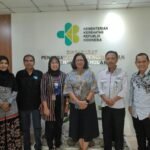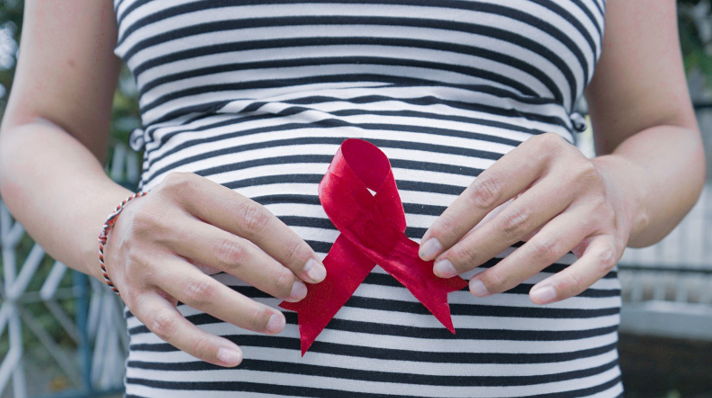
The Continuum of Care for Integrated HIV and AIDS Control
June 5, 2024
HIV and AIDS Control on the Border of Indonesia and Timor Leste
June 6, 2024Break Stigma, Grow Empathy: Health Care Support for Women with HIV
Becoming a prospective mother for the first time must be a precious experience for many women. Getting the news of pregnancy is undoubtedly something to look forward to. Then, the excitement of sharing the good news with those closest to you and preparing for the baby's arrival into the family is a beautiful process. But what happens if the prospective mother is an individual with HIV?

Regardless of the endless moral debates about women with HIV, the fact remains that women or prospective mothers with HIV are among us. According to cumulative data from the Yogyakarta City Health Department in 2023, around 31% of people with HIV (PLHIV) accessing services at various healthcare facilities in Yogyakarta City are women of reproductive age (20-35 years). This means that many of these women with HIV are likely in a period when their reproductive systems are active.
Although the demographics of women living with HIV are relatively high, there are still health facilities that do not serve pregnant women living with HIV in a compassionate and humanizing manner. Through a field survey, a female respondent with HIV who had been pregnant recounted experiencing discrimination in healthcare services. This discriminatory experience left a lasting and traumatic impact. For some, such discriminatory experiences might seem trivial, but for those who face discrimination, it is not something easily forgotten or ignored.
Discrimination Cases at Health Facilities
This story was shared by a mother referred to as Mrs. D. She first found out she was HIV positive during a pregnancy check-up. At that time, Mrs. D was only 24 years old. Distressed by the news, she sought more information from the healthcare workers she could reach. Despite her fear, she went to the nearest health center.
Mrs. D had high expectations for the healthcare services. She hoped that the health center could be a source of strength amid her distressing condition. She expected to receive information and guidance without judgment to go through the pregnancy process safely. Unexpectedly, her service at the health center at that time reduced her confidence. One of the healthcare workers told her that she didn't have the right to be pregnant because she wasn't being responsible for herself.
"You could endanger your baby; why continue the pregnancy?" Mrs. D quoted the healthcare worker saying. Instead of receiving the support she needed, Mrs. D felt so guilty because of this statement. She even isolated herself and avoided further prenatal check-ups. Fortunately, Mrs. D had the full support of her partner. They decided to switch from the public health center to a private clinic, where they received better care. Although six years have passed since the incident, Mrs. D still shows deep trauma when sharing her story.
Currently, Mrs. D accesses healthcare services at Umbulharjo I Health Center, one of the partners of UPKM/CD Bethesda YAKKUM. She no longer experiences discrimination because of her HIV status. However, her previous experiences have left lasting scars, causing fear and suspicion whenever she has to use new healthcare services.
Mrs. A. also experienced unfriendly responses from health workers when she went for a prenatal check-up and did not receive any negative comments from health workers. However, while in labor, some health workers she met seemed afraid to touch her and wore excessive protective clothing. Mrs. A understood that there might be standard procedures for assisting mothers with HIV, but she could sense when people looked down on or were afraid of her because of her status. This unpleasant interaction stayed with her, overshadowing the joy of her child's birth with the discomfort caused by the healthcare workers' attitudes.
Why Does Discrimination Still Exist in Healthcare Services?
Discrimination, as unfair or harmful treatment based on race, gender, age, religion, sexual orientation, health status, physical condition, or other attributes, can affect anyone and occur anywhere. Adverse treatment, unfriendliness, harassment, or disadvantageous treatment doesn't always relate to structured violence but can also manifest through small actions that hurt or disadvantage someone. The experiences of Mrs. D and Mrs. A in the healthcare services they accessed can serve as an example. Although they did not suffer physical harm, they found themselves in uncomfortable situations that should not have occurred simply because they are women with HIV.
Various factors, including persistent stigma, fear, and misunderstandings about HIV and AIDS, can cause discrimination against women with HIV in healthcare facilities. Some healthcare providers may hold opposing views or excessive fear about HIV, leading to discriminatory behavior. Healthcare workers who lack an adequate understanding of HIV transmission, prevention, and treatment can have misconceptions about HIV. Even when educated on the subject, some healthcare workers might still harbor personal biases or prejudices that affect their behavior. This can contribute to discriminatory practices in healthcare services.
Furthermore, some healthcare workers may worry about the risk of transmission during medical procedures. However, it has been scientifically proven that with proper infection control measures, the risk of HIV transmission in healthcare settings is shallow. Training for healthcare workers on providing non-discriminatory and inclusive services for people with HIV is still needed.
The Attempts to Eliminate Discrimination in Healthcare Services
CD Bethesda YAKKUM recognizes the importance of eliminating discrimination in healthcare services against PLHIV, especially pregnant women with HIV. Several activities, both on a large and small scale, have been carried out to eliminate discriminatory attitudes and promote empathy. CD Bethesda YAKKUM has engaged healthcare workers in various workshops focusing on providing friendly and inclusive services for PLHIV.
UPKM/CD Bethesda YAKKUM collaborates with the Yogyakarta City Health Department and involves several partner healthcare services in developing a system or mechanism for assessing PLHIV-friendly services using the PLHIV-Friendly Service Monitoring Tool. The purpose of establishing this mechanism is to ensure that healthcare services prioritize providing non-discriminatory services to PLHIV.
Eliminating or at least reducing stigma is an ongoing process constantly promoted in UPKM/CD Bethesda activities, not only through healthcare services but also through PLHIV. PLHIV, a partner of UPKM/CD Bethesda YAKKUM, also has the opportunity to learn about stigma reduction and self-acceptance. This understanding supported PLHIV in growing into confident individuals knowledgeable about their rights. Through their confidence and independence, supported PLHIV can confront and educate healthcare services or healthcare professionals who still discriminate against them.
Mrs. D and Mrs. A acknowledge that there have been many changes in the healthcare services they access. According to them, the healthcare workers now serve them to perform well without feeling judgmental.
"The healthcare workers now are much smarter," Mrs. D explained. Mrs. A agreed with this statement, saying, "Back when I was pregnant, I actually knew more about the Prevention of Mother-to-Child Transmission of HIV or PMTCT program because I did research, but now the healthcare workers are more responsive and not overwhelmed when asked about PMTCT," she further stated.
Improving healthcare services for mothers with HIV involves a multi-faceted approach that is not simple. These aspects include medical, social, and psychological dimensions. Indeed, changes in healthcare facilities cannot happen quickly or instantly. However, with continuous intervention and collaboration among policymakers, efforts to break down discrimination by fostering empathy through comprehensive and non-discriminatory healthcare services for mothers with HIV are not impossible.
(Meta Ose Margaretha br Ginting)




